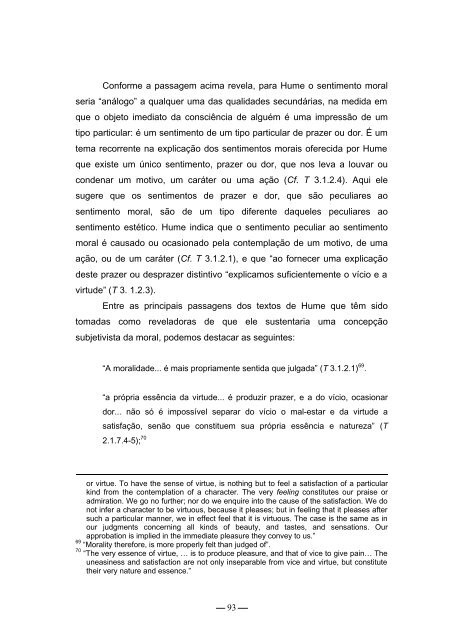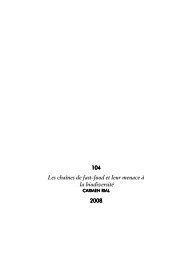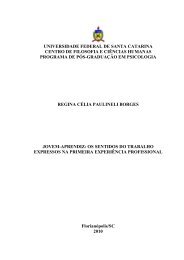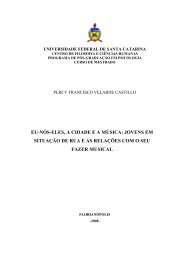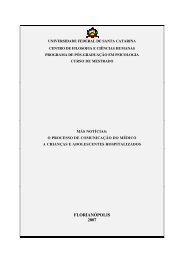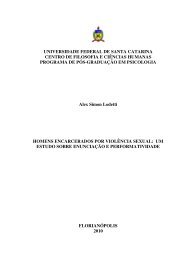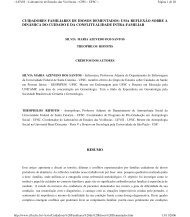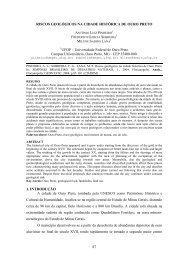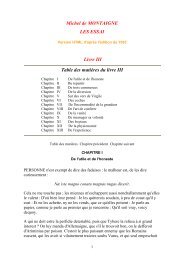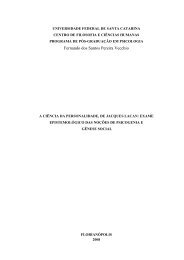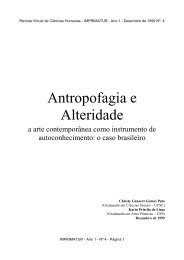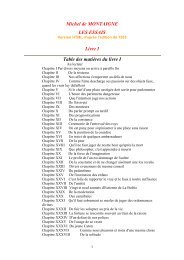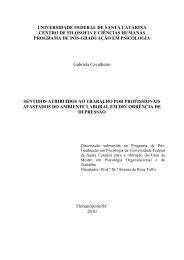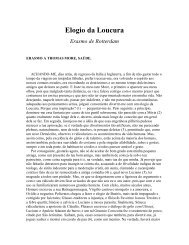A natureza da moral de Hume - CFH
A natureza da moral de Hume - CFH
A natureza da moral de Hume - CFH
Create successful ePaper yourself
Turn your PDF publications into a flip-book with our unique Google optimized e-Paper software.
Conforme a passagem acima revela, para <strong>Hume</strong> o sentimento <strong>moral</strong><br />
seria “análogo” a qualquer uma <strong>da</strong>s quali<strong>da</strong><strong>de</strong>s secundárias, na medi<strong>da</strong> em<br />
que o objeto imediato <strong>da</strong> consciência <strong>de</strong> alguém é uma impressão <strong>de</strong> um<br />
tipo particular: é um sentimento <strong>de</strong> um tipo particular <strong>de</strong> prazer ou dor. É um<br />
tema recorrente na explicação dos sentimentos morais ofereci<strong>da</strong> por <strong>Hume</strong><br />
que existe um único sentimento, prazer ou dor, que nos leva a louvar ou<br />
con<strong>de</strong>nar um motivo, um caráter ou uma ação (Cf. T 3.1.2.4). Aqui ele<br />
sugere que os sentimentos <strong>de</strong> prazer e dor, que são peculiares ao<br />
sentimento <strong>moral</strong>, são <strong>de</strong> um tipo diferente <strong>da</strong>queles peculiares ao<br />
sentimento estético. <strong>Hume</strong> indica que o sentimento peculiar ao sentimento<br />
<strong>moral</strong> é causado ou ocasionado pela contemplação <strong>de</strong> um motivo, <strong>de</strong> uma<br />
ação, ou <strong>de</strong> um caráter (Cf. T 3.1.2.1), e que “ao fornecer uma explicação<br />
<strong>de</strong>ste prazer ou <strong>de</strong>sprazer distintivo “explicamos suficientemente o vício e a<br />
virtu<strong>de</strong>” (T 3. 1.2.3).<br />
Entre as principais passagens dos textos <strong>de</strong> <strong>Hume</strong> que têm sido<br />
toma<strong>da</strong>s como reveladoras <strong>de</strong> que ele sustentaria uma concepção<br />
subjetivista <strong>da</strong> <strong>moral</strong>, po<strong>de</strong>mos <strong>de</strong>stacar as seguintes:<br />
“A <strong>moral</strong>i<strong>da</strong><strong>de</strong>... é mais propriamente senti<strong>da</strong> que julga<strong>da</strong>” (T 3.1.2.1) 69 .<br />
“a própria essência <strong>da</strong> virtu<strong>de</strong>... é produzir prazer, e a do vício, ocasionar<br />
dor... não só é impossível separar do vício o mal-estar e <strong>da</strong> virtu<strong>de</strong> a<br />
satisfação, senão que constituem sua própria essência e <strong>natureza</strong>” (T<br />
2.1.7.4-5); 70<br />
or virtue. To have the sense of virtue, is nothing but to feel a satisfaction of a particular<br />
kind from the contemplation of a character. The very feeling constitutes our praise or<br />
admiration. We go no further; nor do we enquire into the cause of the satisfaction. We do<br />
not infer a character to be virtuous, because it pleases; but in feeling that it pleases after<br />
such a particular manner, we in effect feel that it is virtuous. The case is the same as in<br />
our judgments concerning all kinds of beauty, and tastes, and sensations. Our<br />
approbation is implied in the immediate pleasure they convey to us.”<br />
69 “Morality therefore, is more properly felt than judged of”.<br />
70 “The very essence of virtue, … is to produce pleasure, and that of vice to give pain… The<br />
uneasiness and satisfaction are not only inseparable from vice and virtue, but constitute<br />
their very nature and essence.”<br />
⎯ 93 ⎯


